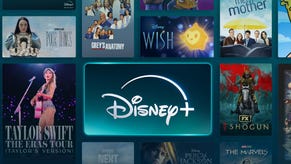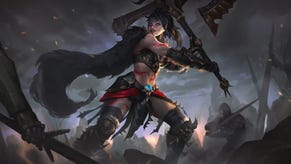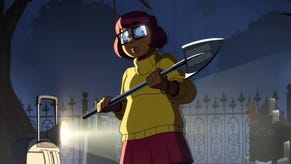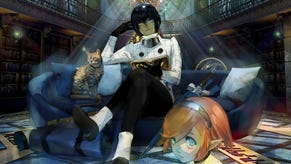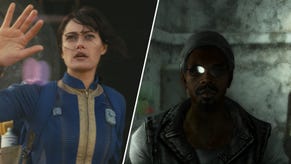Peter Molyneux interview: how to make a great game
Peter Molyneux is free from the shackles of corporate game development. VG247's Dave Cook spoke with the 22 Cans founder about his first project Curiosity, and the big questions in gaming today.
Ever the idea man, Molyneux's new studio 22 Cans exists to create 22 experiments, each fuelling the studio's first - and potentially only - full game. These aren't 22 separate games as such, but individual trials that will give the studio the data it needs to realise its vision.
Curiosity is that first experiment. It's a game that sees players chipping away at a massive cube comprised of 60 billion smaller cubes by tapping on their iOS or Android device's screen.
At the centre of the cube is a prize that Molyneux has called life-changing. It's definitely not money, and as the man himself told us today, it's certainly not Half-Life 3. It's a mystery, but then that's what this social experiment is all about.
Molyneux explained to us that he chose this method of game development because he feels that while he has made several good games - from Syndicate, Black & White to Fable - he feels he has never made a great game. He also feels that the games industry is riddled with titles that fall short of greatness.
In an attempt to better understand Curiosity and the reasons that Molyneux feels our industry is falling short of that greatness, VG247 spoke with the developer, as well as seeing the game play out for ourselves.
VG247: You said that there are plenty of good games out there, but no great ones. Why do you feel that is?
Peter Molyneux: There are some really good games out there, but I don't think that games are exploring enough. The weird thing is that software and games have always been the best things to show off hardware and technology. That's why Intel backs PC games that show off its tech.
But really, there's not that stands out on the iPad - this amazing, innovative and connected device - an really uses all of that potential in an incredible way. So that's why I'm not convinced there are that many great games out there, certainly none that are as innovative as this device is.
I'm not used to that. I'm used to games pushing hardware to the very limit, but there's nothing there yet that gives us the brave new world of the next generation, which is going to be something that involves people in a way that is completely unique.
Are developers not hitting that level of excellence because of some sort of transitional issue as they try to understand new tech and options available to them?
It's taking a while to get the really talented people on to this device. Now - and I will predict this absolutely - some great games are going to come out of the indie community.
I was over in Boston last week and there are some amazing things happening over there, because this device is accessible to those creative people, who have - in a way - been suppressed by having to do games on console.
It does take six months to ingratiate your title through the console submission process. Now on iTunes it takes six days to do the same thing, so with that accessibility, with the amount of available tools for games to use - the cloud, persistence, free-to-play, monetisation - you start see some really great ideas coming through.
It's interesting that you say this rise of excellence comes with people simply being more exposed to the tools and options available to them. It's like Curiosity. I got the base concept but I had no idea how it fully worked. Now, after seeing it live, I get it, as did everyone else who saw it today. Is that a gratifying feeling, that they now understand it?
Yes it is. I mean Curiosity is probably the most scary thing I've ever done because it's very simple - it's just tapping on the screen - and I believe that ideas should start simple, but then go deep enough that you then discover new stuff.
It's very, very exciting, but it's also insanely different, because cube isn't a game as such, because there is only a finite time for it to exist. As the cube starts shrinking down due to people interacting with it, it will one day disappear forever.
This time next year it will all be over, and it won't exist again. In that sense it's very different to a game, because you put a game out there and it's there for all time. The cube you can see on my iPad's screen right now will never be seen in its current state again.
”I know talking can be dangerous, and I was lectured many, many times about how dangerous it is in the past.”
So it's very unique and to be honest I don't know how I completely feel about it. One side of me thinks, 'remember, this is an experiment', We're experimenting, and looking at analytics and metrics towards our full game.
But then I'm thinking to myself, 'well, I'm seeing these things, but how are people going to judge me and what I say about it, based on their personal experience of what this cube is?'
To be fair though, people do like hearing from you because you are an ideas man. Even if they disagree with what you say or the concepts you put out there, they still want to discuss that, and hear from you.
Yeah I mean, they do and I always kind of forget that when I talk to journalists that it will be written up. But if I spoke while thinking about every single word I said, I'd be a PR person reading from a script.
I know talking can be dangerous, and I was lectured many, many times about how dangerous it is in the past. But I just feel if I come out and say honestly what I feel as a consumer, rather than a person in the industry.
That honesty will maybe be something people will respect, and everything I've said I've really believed. I that our team is making a simple, delightful experience and that's not coming from a PR script.
I may then get flamed for saying all kinds of s**t, I know people will probably send me death threats or something, but that's something that as a consumer - I'm sorry - but it's how I feel.
It's actually a valuable thing that you, and other developers view the games they make from the point of view as consumers. Is that what led to Curiosity's microtransaction model becoming a sort of Kickstarter in its own right? People buy a certain amount of in game items can become beta testers and ever characters in your full game for example.
Well the bizarre thing is, if you look at some monetised games that look nice, they're charming and fun - they aren't going to change the world or anything - but then their monetisation is designed purely for greed.
I think people design games that way thinking, 'Oh, I'm going to break into this new free-to-play market and make as much money as I possibly can in the shortest space of time.'
But it's not only games that do this. It's the whole of our entertainment existence that is being monetised. You've got Apple TV that charges me per viewing, you've got Netflix and LoveFilm that charge me on a monthly basis.
"We had this big debate in the office about, should it be the person who luckily taps on the last cube, or should it be the person who taps the most number of cubes."
I think that games are actually leading the way in the monetisation aspect, as aspects of the free-to-play game mentality are heading over to the entertainment side, so it's up to the industry to play around with that and get it right.
What - ideally - you want is people wanting to spend money, and for them to feel that they got something worthwhile out of it. When we approached monetisation for the cube we said 'right. What is it that we want to do?'
We also asked ourselves that if people are spending money, what are they spending that money to do? Are they buying iron chisels to catch up with their friends? Are they frustrated? Do they want to show off more?
It's almost a lottery though isn't it? People will be paying to destroy more cubes in the hope that they will be the one to finally reach the centre. It's almost competitive isn't it?
Yeah, and we had this big debate in the office about, should it be the person who luckily taps on the last cube, or should it be the person who taps the most number of cubes. This debate raged backwards and forwards.
But in the end I said, 'well look, if you buy a lot of special items, you have a bigger probability of hitting the centre.' It's far more likely. If you go into a race and you haven't done any training, you're less likely to win.
People who invest time in things generally end up doing better, but I think there should be that element of chance. Otherwise you know what would happen – it's like leaderboards. If you look at world leaderboards, there's always some bastard at the top with like a score of ten billion.
Everyone else might as well call it a day. If you're making an experience like this that involved thousands and thousands of people, the concept of leaderboards just don't work. So there is that element of chance involved, but I don't know, we could still change our minds about this.
The in-game shop does give people boosters that they can buy for in-game currency and real money. Can you tell us more about the Kickstarter style rewards players can get for investing?
When you go into the shop you are spending money to buy bombs and other things with real money. But we're being very honest with you. We're saying, 'anyone who spends any money on Curiosity will be putting funds into the full game that we're making,' regardless of what they put in.
If you're spending a lot, we'll make sure we keep you updated on our progress with the game, you can be accredited on our list of friends for £20, or is you spend more, we will put you into our closed beta programme so you can play the game months before anybody else.
But spend a little bit more and you – and who you are, and some resemblance of who you are – will be put into our game. If you spend even more we'll make you a main character. So what we're saying is, 'yeah, you're spending money to get these coins, but we feel like giving you more.
It's our thank you for investing in our game, and for helping make our game great. The more money we can acquire that way, the less partners we will need, and that means more freedom to make a great game.
How far forward are you looking to that actual, final game while working on your experiments?
The main game that we're working on at the moment – some people at 22 Cans are working on that – some people are working on the Android version of Curiosity, and some people are working on another experiment.
But everything that we do, every thought that we have, every moment of a day, is all working towards this full game. 22 Cans is only going to make one game and that's it. You just release that single experience then you refine it and adapt it like – and don't think of this in any way other than an analogy – when a TV company makes a soap opera.
They're not thinking about making a sequel to that show. Instead they're thinking of how they make this show as amazing as possible so that people watch it today, and that they will still be watching in a year's time. I like to think of our game like that.
”In Curiosity there is a letter where we say that we’re going to iterate and refine and learn. I think that is accepted as what we will be doing.”
But I'm thinking about, 'how can I make this game relevant, be interesting enough for you to come back?', but to also make it something that feels almost like a hobby. That's a very different thought process for someone like me than making a game, sticking it in a box, and putting it on a shelf.
In that instance the only thing I could do after that is a title update, DLC, or a sequel. But now, with Curiosity, I could literally here, right now, refine that experience.
You have to realise that, if I change one thing in this experience, then it may p**s the whole world off, but if you want to be a part of this world you've got to get into that mindset.
Iteration is important these days isn't it? That ability to go back, fix things, expand ideas and well, basically do what Notch did with Minecraft is appealing to many developers.
I absolutely agree with you, yes. In Curiosity there is a letter where we say that we're going to iterate and refine and learn. I think that is accepted as what we will be doing, and again using my soap opera analogy, that's just the same as what we're doing.
They sit around – say, a team of writers for Eastenders – will sit around and say, 'right, this thing has happened in the world. Do we want to write this into our script?' Now the thing that happened in the world may have happened yesterday, and that's incredibly different if you're a film-maker creating a film about a real event.
Something like Eastenders will operate on a ten-week cycle – they write something here and then ten weeks later we see it on the screen. I want to make our iteration more down to seeing new changes within hours, maybe days for big things that require new assets, and perhaps weeks for huge systemic changes
We can pick a pocket of players and try something out with them as they play. You see that when monetisation is involved where people look at a cross section of players and say, 'lets see how we can get ten more dollars of out those people.'
I want to do that with design instead, like, I want to say to myself, 'can I change something with design that would keep people engaged for ten more minutes?' Because I think if you can do that, then you're delivering an experience that will make people keep coming back.
So iteration is how you reach that vision, but really what you're talking about there is a question of relevance and reaction.
Yeah, and it's this simple: The day Curiosity launches is the day its development begins. That's the way we think, that this isn't the end of the road – it's the start. When the experiment goes live, I mean god, it's going to be one of the most terrifying things, just to see what's happening in the cube.
My first thought will probably be, 'what's happening? How can I curate? Why are people doing those things?' But there are many gameplay secrets hidden within the cube, and if you look here on my iPad's screen, you can start to see part of an image appear beneath the chiselled cubes.
That will be surprising for players, and what you'll see is groups of them joining together because they've seen some little aspect of that image, and they will join together to reveal it. That is pure psychology, and that's so fascinating.
It's curiosity.
It is, yeah, you're right.
What I enjoyed is your idea that you'll be like some sort of virtual god, looking over and tinkering with this world as people work to break down the cube. Isn't that going to be horribly addictive?
Well we've got a wall of monitors, we'll have all the analytics on one screen all the time, and it's going to be fascinating. What will be more fascinating is to choose what we change and when we change it.
You know – and I can see it from people who use analytics for other things – is that you can really screw it up. Also, never, ever, ever look at it and change anything under the influence of alcohol
[laughs] Yeah, that's good advice. You're a big fan of simple ideas that run deep and we're seeing a lot of new indies coming to prominence – be it through mods, fan projects, Kickstarter goals and more. Is this the time for people to get creative?
Any simple idea is actually insanely hard to think of, even if you're just doing it for yourself. But it's an incredible time in the industry now, but don't expect that time to go on forever, because this has happened before in the industry.
It happened about 20 years ago when there were really no big publishers ,and famously there were people who wrote games in 24 hours, shipped it out and made a name for themselves.
The Oliver Twins were a great example.
Yeah, and that's the world we're in at the moment, but it's not going to last forever. So if you can find an idea, and if you really want to play it, and if you really think you can vocalise it and convince people to play it, then now is the time to do it.
This freedom to create success is there, but it will be taken away again soon. It always is. Those publishers will have users that they want to sell more games to, they'll go mobile and make that market more crowded – essentially closing up shop for others.
I think we've got a glorious two years of freedom, where there will be some indie group that will become the new stars of the format. Then it's going to start getting tough for new people to be successful.









